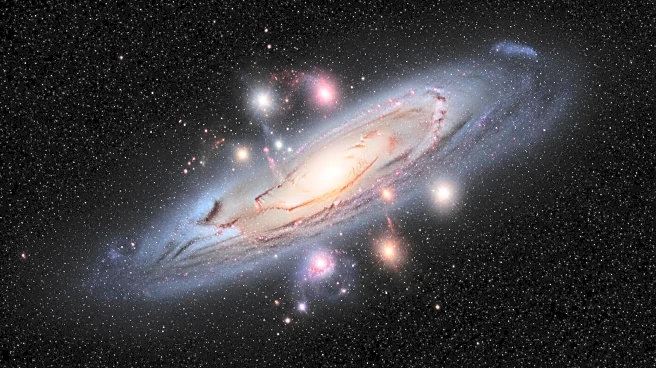What's Happening?
NASA is delving into the mysteries of dark matter, a substance that constitutes approximately 27% of the universe's mass. Despite its invisibility, dark matter plays a crucial role in shaping galaxies and cosmic structures. Scientists have been investigating dark matter since the 1930s, with significant contributions from astronomers like Fritz Zwicky and Vera Rubin. Current research involves studying gravitational lensing effects, which provide indirect evidence of dark matter's presence. NASA's upcoming missions, including the Nancy Grace Roman Space Telescope, aim to map dark matter distribution, enhancing our understanding of the universe's organization and evolution.
Why It's Important?
Understanding dark matter is vital for comprehending the universe's structure and dynamics. It influences galaxy formation and movement, impacting cosmic evolution. Insights into dark matter could lead to breakthroughs in physics, potentially revealing new particles or forces. This research is crucial for advancing astrophysics and cosmology, offering a deeper understanding of the universe's fundamental components. The study of dark matter also has implications for future space exploration, as it may affect navigation and mission planning in regions with significant dark matter presence.
What's Next?
NASA plans to continue its exploration of dark matter through advanced telescopes and observational techniques. The Nancy Grace Roman Space Telescope will play a key role in mapping dark matter, providing data to refine existing models and theories. Scientists will analyze gravitational lensing effects to better understand dark matter's distribution and properties. Collaborative efforts with international space agencies and research institutions are expected to enhance the scope and impact of these studies, potentially leading to groundbreaking discoveries in the field of astrophysics.
Beyond the Headlines
The study of dark matter raises philosophical and ethical questions about humanity's place in the universe. It challenges our understanding of reality, prompting discussions about the nature of existence and the limits of human knowledge. As scientists uncover more about dark matter, it may lead to shifts in cultural and scientific paradigms, influencing how society perceives the cosmos and our role within it.










